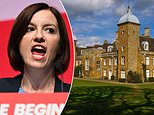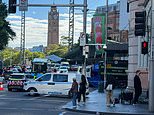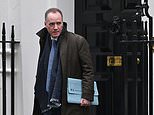
Few sectors of the British economy are looking forward to the Chancellor’s Spring Statement today with anything but a queasy sense of foreboding.
One, in particular, is especially fearful of being picked on for the simple reason that Labour’s ideological wrecking ball has already done untold damage.
If private education is singled out for any further punishment, those working within it say, then what is already a crisis will become a disaster. And it is abundantly clear that Labour’s class warriors would not merely not care, they would be delighted.
Hence the Education Secretary Bridget Phillipson’s astonishing admission to the Mail this week that, after eight months in office, she has yet to visit a single school in the sector.
This, lest we forget, is a sector which educates more than 650,000 British children – but which will soon be on its knees.
For private schools are already steeling themselves for the start of the new tax year next month. They knew that VAT on fees was coming the moment Labour won the election, but few expected it to be imposed at the breakneck speed Labour demanded.
Then, news of the National Insurance hike was exacerbated by a uniquely spiteful edict that charities were to pay full business rates. Not all charities, of course. Just those providing private education.
So, should the Chancellor place any additional burdens on employer costs – another NI hike or any tinkering with staff pensions – that could prove terminal for schools which are already on the brink.
Bridget Phillipson admitted to the Mail this week that, after eight months in office, she has yet to visit a single school in the sector
Maidwell Hall, Earl Spencer’s former school, will be closing its doors for good in July
The Daily Mail has been investigating the state of private education since Labour declared war on the sector. The casualty list currently includes at least 15 schools in the process of closing, on top of eight already gone. That is just the start.
In each case, there is a mix of contributing factors but one common, overarching reason: Labour’s ideological war on parents who choose to spend their hard-earned cash on their children’s education rather than, say, a new car or an exotic holiday.
The current list of dead or dying schools represents just the first of many more casualties. Industry experts predict that we could see between 100 and 200 more schools disappear in the next couple of years as Labour’s onslaught starts. The head of one consortium calls this the ‘greatest upset in education in 500 years’.
All agree that it will make no difference to the elite top tier of public schools, the posh citadels that bring the Labour Left out in hives. Those schools will become more exclusive still, catering to a global elite who can still match the rising prices.
But the super-wealthy will only pay for a British education, as long as it remains quintessentially British. Chinese or Nigerian millionaires will not pay £60,000 a year to send a child to that school if UK children are no longer there.
In the firing line are those smaller, local schools which are not household names, charging around £5,000 to £6,000 a term post-VAT. Some are family-run operations. Some are operating within a larger consortium, but will be flogged to feed the other siblings until it is time for another cull. All are already operating on the flimsiest of margins.
Take the Royal School near Haslemere in Surrey. Parents were told only last month that the 200-year-old school will close in July and are now finding that alternatives, both private and state, are full.
Ditto, the girls at St Hilda’s prep school in Bushey, Hertfordshire. Many parents liken the current situation to ‘a bereavement’. One says it is like living with a loved one with a slow terminal condition.
‘I do know what grief is like,’ says a mother at one school, now approaching the end. ‘And when it’s a place that your children adore and it’s the centre of your little world, well, there is a genuine sense of loss.’
Staff at Maidwell Hall in Northamptonshire are still trying to put on a happy face as the children arrive each morning. But it’s hard to keep smiling when the main topic of conversation is which colleague has found a new job or which child has found a new school.
After a century, Maidwell Hall will be closing its doors for good in July.
Losing a school is not the same as losing a factory or a village shop. It’s not just a place of work and a community focal point. It is the repository of the hopes, loyalties and collective memories of generations of children. For most, it is their ‘happy place’. Maidwell may have hit the headlines after Earl Spencer wrote a ‘misery memoir’ of his life there 50 years ago. But today, say parents, it is positively idyllic.
Former Sky presenter Ana Boulter has spoken out in criticism of Ms Phillipson on her booming YouTube channel
Head of Claires Court School in Maidenhead, James Wilding (centre) is Britain’s longest-serving school, pictured with his school’s head boy and head girl
School numbers had actually been going up in recent years, with many parents attracted by the blend of fun, games and openness. It was doing well academically, too, with 16 scholarships to top schools last year alone.
Days before the start of this term, however, Maidwell’s owner, the famous Rutland public school Uppingham, announced it could no longer make the numbers work. With financial challenges of its own, Uppingham remains determined to close and sell off this happy feeder school. Even though a group of business-savvy parents have offered a viable rescue package, Uppingham has rejected it.
It is a sad situation, made all the sadder given that Ms Phillipson is supremely unbothered.
Earlier this month, I asked the Department for Education if it could confirm whether the Secretary of State had visited a single private school. Finally, a week later, I received this reply: ‘Private schools are private businesses and the Secretary of State for Education is focused on improving state-funded education which serves 93 per cent of children in England.’
If any government was singling out any other industry for special attention, be it energy or construction, the relevant minister would at least bother to show a modicum of interest.
Labour’s official reason for slapping a 20 per cent tax on private schools is that they only educate 7 per cent of children and that the added revenue will fund 6,500 extra teachers in the state sector.
Opponents point out a number of flaws with this. For example, given that most children at private schools spend some time in the state sector, too, the true figure who use private education is around 20 per cent.
Meanwhile, as the rising cost of going private squeezes more children into the state system, at a cost of £7,400 per child per year, the net gain to the Treasury will be zilch. This month, Labour has been quick to jump on council data showing a modest rise in demand for state school places contrary to Tory predictions of a stampede. ‘The scaremongering that they have been suggesting just hasn’t come to pass,’ Ms Phillipson told MPs.
It is a response that dismays those currently coping with the impact of Labour policy. ‘It was surprising to hear the Secretary of State unkindly describe independent school closures as ‘scaremongering’,’ says a spokesman for Carrdus prep school, which is now preparing to shuts its doors in Oxfordshire. ‘The situation is very real for us. Parents and staff are deeply upset by the school’s closure, and it is our pupils who are most damaged by the school’s closure.’
Labour’s spin doctors like to paint private school parents as raging snobs, usually lobbing in a snide reference to their children as ‘Tarquins and Jocastas’.
In most cases, of course, we are talking about two working parents, most of them ‘first-time buyers’, who were not privately educated themselves. They have chosen to spend money giving their children an opportunity that they might not have at a local state school.
In a disproportionate number of cases, too, it has been a decision driven by a special need or the absence of particular support from the local authority.
Even strong schools, well-placed to weather this crisis, are – to say the least – disappointed by the Government’s lack of engagement with the private sector.
Britain’s longest-serving school head, James Wilding, is a mine of experience whose advice was frequently sought by previous governments of various administrations. A teacher for 50 years and head for 44, he shows me his thoughtful emails to Ms Phillipson’s office both before and since the election, asking for an opportunity to explain how the private sector can work more productively with the State.
He eventually received a stock ‘thank you for your correspondence’ reply but nothing more.
His parents set up Claires Court School, near Maidenhead in Berkshire, after the war. It is a thriving independent day school educating almost 1,000 boys and girls aged two to 18 across three sites.
He has already reworked the sums to ensure that, after a modest fee increase, there will be no rise for at least another year. It’s a happy, buzzy school which is assiduously anti-mobile phones while in the vanguard of teaching AI. Many pupils go on to top universities, but it is also in the top flight nationally for tennis and sailing.
‘The main thing is you have to keep talking to the community to see how you can help. We have hundreds of local people using our facilities every week,’ says Mr Wilding.
He adds that he was rather surprised by Ms Phillipson’s swipe at private schools for spending money on ’embossed stationery’ and ‘AstroTurf pitches’ in October. (She herself was filmed on one just days later, playing hockey on a private school sports field).
As Mr Wilding points out, he only built his recently-installed AstroTurf pitch because most of the local state schools already had one.
The key to survival is size, he says, pointing out that tax rises, pensions and regulatory obligations mean that each member of staff costs roughly £80,000.
A lifelong member of the Lib Dems, he is not some stereotypical Tory dinosaur. He also points out that most children with two working parents start out at a private nursery anyway that ‘often costs more than we do’.
The sector is not sitting idly by. There are at least two major legal actions in hand, with emphasis on the damage done to children with special needs.
A recent Westminster debate on the subject threw up some lamentable tales. Reform MP Richard Tice pointed to the ‘absolute insanity’ of a constituent with two children who have been forced from the independent sector to new state schools so far from home that the county council now pays £20,000 per year for taxis.
Parent action groups are popping up everywhere. Leading the charge is former Sky presenter Ana Boulter who has a booming YouTube following for her daily updates and reflections.
‘Why won’t Bridget Phillipson engage? I just think she just looks at us as statistics. She can’t bear to see that there are children in the middle of all this,’ she tells me as she picks up her child from Stamford School in Lincolnshire.
Here is an unstuffy, confident and dynamic school going back to 1532 which is the heart and soul of the town.
With 500 members of staff on the payroll, it is also the largest local employer. Plenty of these 1,400 boys and girls are from modest homes. Most are day pupils and Ana knows people who are ‘raiding their pensions’ to keep their children here.
I meet the principal, Mark Steed, who is tackling the new economic landscape head on. ‘If a subject does not have at least six students for A-Level, then we have to drop it,’ he says sadly.
When this school was founded, Latin was the only thing on the curriculum. Soon it will be no more. Yet, the catchment area stretches for miles across this rural patch.
‘In some London schools, the cool thing is bringing in vapes. Here, they bring in a hatching chick,’ jokes Ms Boulter.
It explains why Stamford is now adding a BTEC in agriculture to the syllabus. Such are the choices healthy schools are making to stay healthy.
John Forsyth is the founder of Forfar Education, a growing group of 12 well-established private schools right across the country. He tells me that, before the election, he might have been approached by just one or two private schools wanting to come under his umbrella each year. ‘Now I suddenly have a list of 80 schools who want to do a deal immediately.’
Sadly, he will be able to accommodate only a handful of viable ones. ‘This crisis has only just begun. What we are looking at is the greatest upset in education this country has seen in 500 years.’
Some school groups are trying hard not to pick a fight with the Government. For example, United Learning, which owns The Royal School in Haslemere, insists that this famous old school (whose president is the Princess Royal) is shutting purely because of falling numbers.
‘It isn’t about VAT on fees,’ says a spokesman. Except parents and the school’s local Tory MP, Greg Stafford, say that it is.
The leaked minutes of this month’s emergency meeting with parents confirm this, with the school’s senior management admitting that Government policies have led to a ‘perfect storm’. Parents tell me that, because United Learning has several state academies in its portfolio of schools, it is anxious not to upset Labour.
Ms Boulter has no such qualms. ‘People thought that Phillipson would at least do this sensibly and over time,’ she tells me. ‘Instead, it’s clear she and Rachel Reeves and Keir Starmer are determined to wreck one of this country’s greatest assets. They won’t be forgiven.’
- Additional reporting by Simon Trump.





